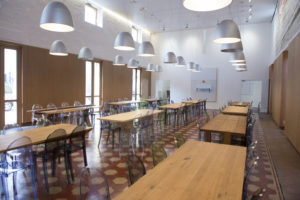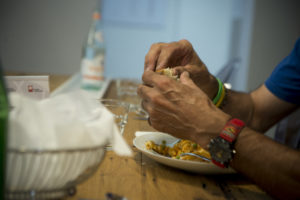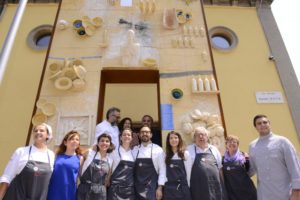Reviewed by Bill Locke
Theater of Life is a compelling feature length documentary film about the rich and the poor, the centrality of food in everyone’s life, and the values of art and beauty.
Expo 2015 was hosted in Milan, Italy, with pavilions from 145 countries featured in the Expo Village, all focused on the theme “Feeding the Planet, Energy for Life”. It lasted for six months, and welcomed over 22 million visitors.
Expo 2015’s theme gave impetus to an unlikely and wonderful project: the making of Refettorio Ambrosiano, a very special soup kitchen that brought together the world’s greatest chefs to feed the homeless and refugees of Milan, using waste food from the Expo. A new documentary film about this project, Theater of Life, is a feast for the eyes and the soul – not only for gourmands, but for all who care about their fellow human beings.
Massimo Bottura is a famous Italian chef who first came up with the idea for Refettorio Ambrosiano. In 2016, his restaurant Osteria Francescana in Modena, Italy was rated number one in the prestigious “World’s 50 Best Restaurants” list. His love for cooking began as a young boy, hanging out in the kitchen watching his grandmother, Ancella.
“I have followed my passions for over thirty years to find my voice,” says Bottura. “The time has come to use it to make visible the invisible. Around the world, we waste one third of the food we produce.”
And out of that concern, a great idea (and subsequently a great documentary film) was born.
Bottura enlisted the help of Davide Rampello, curator of the Milan Expo’s main pavilion. Together they turned to the Vatican – specifically Cardinal Angelo Scola of Milan – for help. The Cardinal was immediately enthusiastic. The Church’s charitable arm in Milan, Caritas Ambrosiana, was asked to help run the soup kitchen in a neglected neighbourhood in Milan called Greco. The local parish priest in the community, Fr. Don Guuliano, suggested an abandoned theatre near his church as a possible site for the project. I love what happened next.
Bottura and Rampello turned to the largest technical university in Italy, the Polytechnic University of Milan, for the design and transformation of the old theatre. They also asked fourteen of Italy’s finest designers to donate their time to design the furniture. They then asked five of Italy’s greatest artists to create original works of art for the space. All donated their work. And finally, they invited 60 top chefs from around the world to come rock in the kitchen using Milan Expo’s discarded food. Nineteen of these chefs appear in Theater of Life, produced by Seville International and Canada’s National Film Board. Canadian director Peter Svatek takes us behind the scenes, into the kitchen, onto the street, and into the hearts of those who cook and those who eat the gorgeous food that is served.
We see Motturra and his team of volunteers convert the decrepit old theatre in this poverty-stricken section of Milan into a restaurant fit for royalty. Finally, the doors are opened, and refugees, addicts, street workers, the homeless and the hungry are welcomed in, every day, to eat like never before. They find that the philosophy of the Refettorio is different from that of most soup kitchens. There are no lineups. Food is served restaurant-style, with great respect for the patrons. And the food itself…well, you can only imagine, given the hands that have prepared it.
Rather than focus on the celebrity chefs who participate in this grand project, the film comes up close to the people they serve. We meet Stefania and Marco, a larger-than-life middle aged couple who sleep in a train station. He’s a musician who plays on the streets with gusto. She tells their story with disarming honesty. We meet a beautiful young Senegalese woman named Fatou, disabled by polio. She knows first-hand that the prospects for the disabled in her country are grim. She came to Italy as a refugee, and dreams of becoming a schoolteacher. We meet Fawaz, a Jordanian immigrant to Italy, who has a smile that lights up the room, and who suffers from amnesia. He sleeps in his car, which he can’t afford to drive. We meet Christiana, from Nigeria, who was forced into prostitution as a teenager. She managed to escape that trap, and hopes to start a new life in Milan for her and her baby.
Finally, there are the great questions: What fears and misconceptions must we face, that stop us from addressing the great discrepancies between the rich and the poor in our midst? What is the role of art and artists in our society? Is it possible to stem the tide of food waste all around us? How can we best enable and empower communities to use their skills to help those in need?
When I first read about this film, I didn’t know what to think. It seemed remote, a documentary about an obscure food project in Milan, Italy. Then I watched the film…and I couldn’t stop watching.
The inspiration of Massimo Bottura is addictive. As he poured out his heart and his ideas to those who would listen – culinary professionals, designers and architects – I was struck by something. It made me recognize the extravagant generosity that we read about in the Gospels. I thought of Jesus’ friends, Martha and Mary, and Mary’s wanton, radical, outrageous act of love described in the twelfth chapter of John.
Six days before the Passover, Jesus came to Bethany, where Lazarus lived, whom Jesus had raised from the dead. Here a dinner was given in Jesus’ honour. Martha served, while Lazarus was among those reclining at the table with him. Then Mary took a pint of pure nard, an extremely expensive perfume and poured it on Jesus’ feet and wiped his feet with her hair. And the house was filled with the fragrance of the perfume.
But one of his disciples, Judas Iscariot, who was later to betray him, objected, “Why wasn’t this perfume sold and the money given to the poor? It was worth a year’s wages!”
Christ did not condemn Mary for what she did. In fact, he defended her. It seems there is a time for extravagance. Massimo Bottura seems to think so.
The film also includes the blunt reactions of the homeless people to Refettorio Ambrosiano. Rather than kissing the feet of the kitchen professionals, they were occasionally unimpressed or amused by the artistic dishes that they were being served. Sometimes, they asked for more, but sometimes they preferred regular food that filled their bellies.
One of the most telling statements in the film was from Fawaz, the immigrant from Jordan who suffered from amnesia: “People feed us, but they don’t sit down with us.” He speaks to the greatest need of the poor and homeless, which is to have a heart connection with a fellow human being. Perhaps the greatest luxury of all is to have someone who cares about me enough to spend time with me, to ask about my story, to care about my dreams. I guess we are a lot like the Samaritan woman who came to the well for water. Jesus gave her more than something to drink. He gave her living water, attention, hope, peace, life.
And in the film, we see the chefs, volunteers and the diners themselves coming together, getting to know each other, forming relationships and opening their spirits to one another. We also learn that out of this experience, Massimo Bottura went on to found a non-profit organization called “Food for Soul”, with the goal of replicating the model of Refettorio Ambrosiano elsewhere. In August 2016, at the Rio Olympics, “Food for Soul” converted surplus food from the Olympic Games into healthy meals for the poor in Rio de Janeiro. They are now working on establishing other similar projects around the world.
And what about Refettorio Ambrosiano itself? Did it close down after Expo 2015? It has, in fact, become a permanent asset to the city of Milan, and the neighbourhood of Greco. It not only continues to feed hungry people with waste food from grocery stores, schools and restaurants in Milan, it has also become a community centre, presenting theater, music and special events for the community.
Would I recommend Theater of Life? Yes. It made me think. In fact, I can’t stop thinking about some of the questions it raised. But more importantly, it made me feel. I hope it does for you, too.
Theater of Life is available on Netflix and iTunes.












